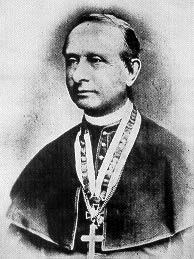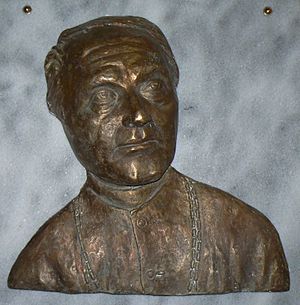Franjo Rački facts for kids
Quick facts for kids
Franjo Rački
|
|
|---|---|
 |
|
| Born | 25 November 1828 Fužine, Kingdom of Croatia, Austrian Empire |
| Died | 13 February 1894 (aged 65) Zagreb, Kingdom of Croatia-Slavonia, Austria-Hungary |
| Occupation | Historian, politician, writer |
| Nationality | Croatian |
| Signature | |
 |
|
Franjo Rački (born November 25, 1828 – died February 13, 1894) was an important Croatian historian, politician, and writer. He collected many old Croatian historical documents. He also wrote early historical books and helped start the Yugoslav Academy of Sciences and Arts.
Contents
Franjo Rački: A Life in History
Franjo Rački was born in Fužine, a town near Rijeka. He finished his high school education in Senj and Varaždin. He then studied theology in Senj and became a Catholic priest in 1852. Rački earned his PhD in theology from Vienna in 1855.
Early Historical Work
Rački's work as a historian began when he started teaching in Senj. He was a very hardworking and patriotic person. He organized research into old Glagolitic documents. These documents were found on the islands of Kvarner. He often visited Baška on the island of Krk. This is where the famous Baška Tablet was found.
After studying the tablet for a long time, he published a book. It was called Viek i djelovanje sv. Cirilla i Methoda slavjamkih apošlolov. This title means The Age and Activities of Saints Cyril and Methodius, the Apostles among the Slavs.
Research in Rome
In 1857, Rački moved from Senj to Rome. He worked at the Croatian Institute of St Jerome for three years. During this time, he faced difficult conditions. He searched through many Roman archives. He was looking for documents about Croatian history. He also took courses in paleography, which is the study of old writing.
In Rome, he found many documents about the Bogomils. The Catholic Church had collected these during the medieval fight against this heresy. Fifteen years later, Rački published Bogomili i Patareni. This book was a big step in studying the Bosnian Church.
The Bogomil Hypothesis
In his book, Rački suggested the "Bogomil hypothesis". He said the Bosnian Church was influenced by dualist teachings. These teachings came from Bulgaria in the 9th century. This idea was very interesting and debated. It was the main theory for much of the 19th and 20th centuries. However, most of its main points have since been proven wrong.
Important Historical Writings
Even though Rački was more important for promoting culture, his original historical books are significant. They were pioneering and full of information. Besides Bogomili i patareni, he wrote other important works. These include Povjesnik Ivan Lučić (The Historian Joannes Lucius). He also wrote Nutarnje stanje Hrvatske prije XII. stoljeća (The Internal Organization of Croatia Before the 12th Century). Other works are Stari grb bosanski (The Old Bosnian Coat of Arms) and Povelje bosanskog kralja Tvrtka (Documents of the Bosnian king Tvrtko). His most important scientific work is the large book Documenta historiae Croaticae periodum antiaquam illustrantia.
Building Croatian Culture and Science
Franjo Rački started Književnik, the first Croatian scientific magazine. It covered history and linguistics. He also started Obzor and Vijenac. These were very important magazines for culture and politics.
He was a key person in founding the Yugoslavian Academy of Sciences and Arts. He also greatly helped the University of Zagreb grow. Rački started most of the Academy's publications. These are still published today, like Rad and Starine. He also started the Codex diplomaticus Regni Croatiae, Dalmatiae et Slavoniae. This is a very important collection of legal history documents. He founded the Academy's library, archive, and dictionary. His work shaped how the Academy operated for many decades. This was especially true for its cultural and social activities.
A Politician for Croatia
In 1861, Franjo Rački became a member of the Croatian Parliament. He was a church representative from Senj. The parliament had not met for 12 years before this. Rački and Ante Starčević were the only members who came from peasant families.
Rački wrote a lot about politics. He wrote about all the important issues for Croatia at that time. He supported joining Dalmatia with Croatia, which was ruled by the ban. He also wrote about Srijem and Rijeka being part of Croatia. But he spent most of his energy on the relationship between Croatia and Hungary. He fought against Hungary trying to expand its power over Croatian lands. Along with Bishop Josip Juraj Strossmayer, Rački supported the idea of Yugoslavia. They both promoted the cultural and political unity of the South Slavs.
Franjo Rački died in Zagreb.
See also
 In Spanish: Franjo Rački para niños
In Spanish: Franjo Rački para niños
 | Bayard Rustin |
 | Jeannette Carter |
 | Jeremiah A. Brown |


